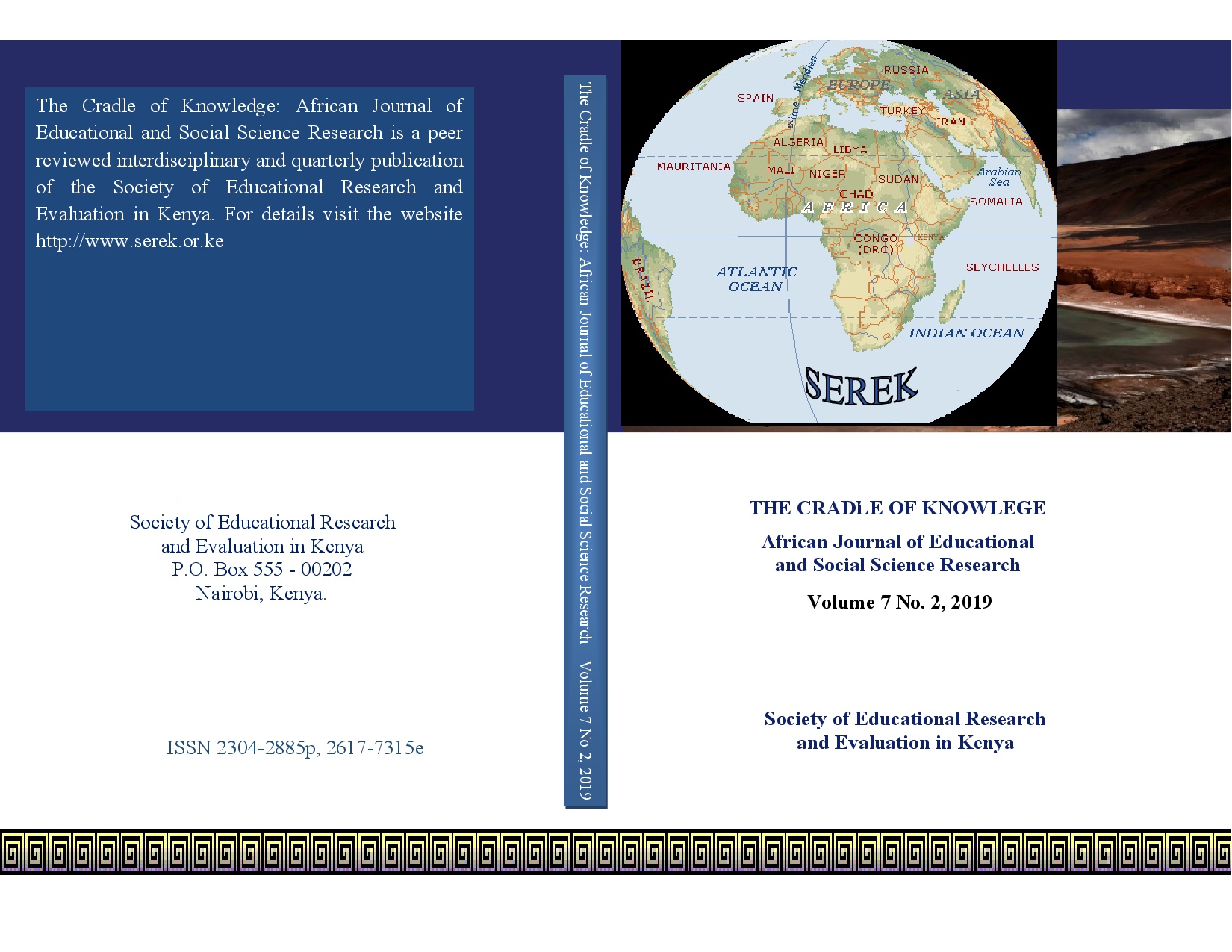
The Utilization of Experience in the Noble Leadership of Secondary Schools in Nandi County: A focus on Principal’s Integrity
Abstract
Experience or what others consider as knowledge or mastery of events through involvement in or exposure in the course of time, is an important practical wisdom gained from encounters in school. Following cases of corruption and integrity concerns in Nandi Secondary schools, this study focused on the experience of the principal as an attribute of his religiosity and Leadership. How does experience affect a principal’s religiosity and his/her leadership style? The study was anchored on Tony Bush’s Leadership theory of Leadership and guided by ex- post facto research design. The target population was principals, teachers and student leaders of secondary schools in Nandi County. Stratified and simple random sampling was used to sample schools, teachers and prefects. The study used three data collection methods, questionnaire, interview schedule, and content analysis guide. Experts were consulted to determine the content validity of instruments. Reliability was determined by use of Cronbach’s alpha that yielded 0.687. Hypotheses 1 and 2 were tested using t-test and analysis of variance. To determine relationship between experience and both religiosity and leadership style, ANOVA tests was carried out. Experience was shown to have a positive effect on principal’s religiousness and leadership styles. Good leadership and improved religiosity goes with long experience in the profession. Principals should meet a minimum requirement in experience (among other requirements) to be allowed to run a school. The findings of the study may assist in drafting a better principals’ policy for appointment.
Key words: Leadership styles, Experience, Secondary Education Principal
Full Text:
PDFReferences
CESA 16-25(2017) Continental Education Strategy for Africa Journal Volume 1; Africa Union Commission, www.adeanet.org/en/system/files/cesa.
Covey, S. (2001). Leadership is a choice: The four roles of a Leader. http://www.wyn.com. Retreated 29th Dec. 2016.
Day, C. (2009). The impact of school leadership on student outcomes. Nohingham: University of Nottingham Press and Sage.
Dessler, G. (2004). Management: principles and practices for tomorrow’s leaders (3rded). Boston: Pearson prentice hall.
Directorate of Quality Assurance and Standards, tetu district, (2010. Education annual report
Edmodus, R. (2008). A Case of Form- Focused Instruction (FFI) http://www.edmodo.compg 67-106. Retreaved 11th Jan. 2017
Girling, L. (1991). Education, Management and Participation. Allyn and Bacon, Boston.
Harvis, A & Spillane, J. (2008). Distributed leadership through the looking glass. Management in education, do/22:31
Holton and Naquin (2000). Developing High Performance Leadership Competency. San Francisco CA:Berret- Koehler Communications, Inc.http//www.jstor.org/stable/1585814. Accessed 21-11-2017
Kenya National Bureau of Statistics (2015) Economic Survey 2015,
Lorri, M. (1985) Improving Conditions for Principal Effectiveness: Policy Implementations of Effective Schools Research. The University of Chicago Press. Stable URL : http//www.jstor.org/stable/1001531
McGrath, N. (2000). The Entrepreneurial Mindset. Boston: Harvard Business School Press.http://4entrepreneur.net/2011-principlesofentrepreneurial leadership.
Miller, P. (2012). The changing nature of educational leadership. Journal for the university of Cayman islands 6 ( December): 5-8, special issue
Ministry of Education (2016) Implementation of Free Secondary Education and Challenges. 2016-22. Nairobi: Government Press.
Morris, T., (2010). Leadership: why gender and culture matter. American psychologists 65.3 pp 157.
Mulwa, F. (2010). Demystifying participatory community Development. Nairobi: Pauline publishers.
Neal, D. (1997). The Effect of Catholic Schooling on Educational Achievement: Journal of Labour Economics 15, Pg 111-121.
O’Leavy, Z. (2010). The Essential Guide of doing your Research project. Sage Los Angeles.
Stronge, J. (1993). Defining the principalship. Instructional Leadership or Middle Manager. National Association for Secondary Schools Principals Bulletin, 77, 1-7.
TSC, (2009). Causes of strikes in schools teachers’ service commission Nairobi Vol 2, pp 13.
Yilmaz, C (2008) The Effect of Teaching Practice on Classroom Management Beliefs; Eurasia journal o mathematics, science and technology education. 4(1), 38-55. Google Scholar, Crossref.
Refbacks
- There are currently no refbacks.
SEREK publication https://serek.or.ke
This work is licensed under a Creative Commons Attribution 4.0 International License